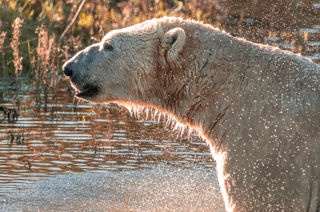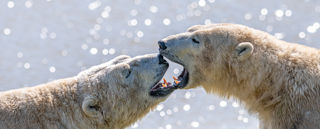
Polar Bear
Ursus maritimus

-
Size
Up to 600 kg
-
Threat
Climate Change
-
Distribution
Arctic
-
Diet
Carnivore
Our world-class habitats are currently home to six wonderful Polar Bears: 'The Boys' Nobby, Hamish, Luka, Indiana, Yuma & Sisu who can be found at the 10-acre reserve.
This is one of the world's leading centres for Polar Bear welfare and conservation.

Where in the park?
Welcome to Project Polar - the largest Polar Bear centre outside Canada.



Species
Polar Bears are the largest living land carnivore on Earth, with adult males reaching between 2.5 and 3 metres in length. They live along the coastlines in the Circumpolar North and the Arctic tundra. Their latin name means ‘Sea Bear’.
Did you know?
The largest lake at Project Polar contains over 25.5 million gallons of water! The cold 8 metre deep lake is fantastic for these amazing animals to swim, dive and play in and features an island that you will frequently see the bears jumping off into the water.


Threats
Native arctic bears are divided into 19 subpopulations. Several of these populations are at risk of declining numbers due to climate change. Scientists predict that unless we take action to mitigate man-made climate change, Polar Bears may go extinct by the end of this century.
Did you know?
Polar Bears depend on sea ice for hunting and breeding. This is melting at an alarming rate due to human activity. The Wildlife Foundation support Polar Bears International in building momentum for action on climate change and work closely with the world’s leading Polar Bear and climate scientists.

WHAT? NO SNOW? ❄️
- Project Polar, Doncaster. Average temperature in July 20°C
- In Churchill, Canada, Summer temperatures can reach up to 26°C
Whilst Polar Bears depend on the sea ice to access their hunting grounds for seals, in order to breed and to raise their cubs, many bears do not live on ice all year round.
However, climate change is making the bears wait for the arrival of the sea ice longer each year.
Bears live in the summer tundra with no snow for up to 6 months.



Polar Bear Experience
Our Polar Bear Experience is truly a fantastic and unique opportunity to get up close and personal with our Polar Bears!
Donate to the WildLife Foundation
We can’t do what we do without you. Donate to WildLife Foundation today!
Your donations – however big or small – make a HUGE difference to animals around the world that really need our help.
Text / SMS donations:
To donate £1, text POLBEAR5 to 70201
To donate £3, text POLBEAR5 to 70331
To donate £5, text POLBEAR5 to 70970
To donate £10, text POLBEAR5 to 70191









